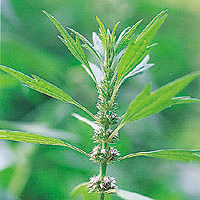Motherwort
 © Martin Wall
© Martin WallParts Used & Where Grown
Motherwort came from central Eurasia originally, but has spread to all temperate areas of the world, primarily as a garden plant but also as an escaped weed. A similar plant, Leonurus heterophyllus, is used in China. The Chinese name for motherwort is yi mu cao, meaning “benefit mother herb.” The leaves and flowers of this mint family plant are used as medicine. In Chinese herbal medicine, the seeds are also employed.
- Reliable and relatively consistent scientific data showing a substantial health benefit.
- Contradictory, insufficient, or preliminary studies suggesting a health benefit or minimal health benefit.
- For an herb, supported by traditional use but minimal or no scientific evidence. For a supplement, little scientific support.
Our proprietary “Star-Rating” system was developed to help you easily understand the amount of scientific support behind each supplement in relation to a specific health condition. While there is no way to predict whether a vitamin, mineral, or herb will successfully treat or prevent associated health conditions, our unique ratings tell you how well these supplements are understood by the medical community, and whether studies have found them to be effective for other people.
For over a decade, our team has combed through thousands of research articles published in reputable journals. To help you make educated decisions, and to better understand controversial or confusing supplements, our medical experts have digested the science into these three easy-to-follow ratings. We hope this provides you with a helpful resource to make informed decisions towards your health and well-being.
This supplement has been used in connection with the following health conditions:
| Used for | Amount | Why |
|---|---|---|
Amenorrhea | Refer to label instructions | Motherwort has traditionally been thought to stimulate absent or diminished menses, though it has not been studied clinically. |
Anxiety | Refer to label instructions | Motherwort is one of a group of “nerve tonic” (nervine) herbs used in traditional herbal medicine for people with anxiety, with few reports of toxicity.
|
Menopause | Refer to label instructions | Motherwort is an herb with weak estrogen-like actions similar to soy. In one trial, a formula containing licorice, burdock, dong quai, wild yam, and motherwort reduced menopause symptoms. |
Traditional Use (May Not Be Supported by Scientific Studies)
The use of motherwort is practically the same in European folk medicine and traditional Chinese herbal medicine. It was widely used to regulate menses and to treat associated conditions.1 It was also considered a helpful diuretic and heart-strengthening herb by herbalists in both cultures, particularly to alleviate heart palpitations associated with anxiety attacks.2 Europeans used motherwort as a sedative as well.3
Copyright © 2025 TraceGains, Inc. All rights reserved.
Learn more about TraceGains, the company.
The information presented by TraceGains is for informational purposes only. It is based on scientific studies (human, animal, or in vitro), clinical experience, or traditional usage as cited in each article. The results reported may not necessarily occur in all individuals. Self-treatment is not recommended for life-threatening conditions that require medical treatment under a doctor's care. For many of the conditions discussed, treatment with prescription or over the counter medication is also available. Consult your doctor, practitioner, and/or pharmacist for any health problem and before using any supplements or before making any changes in prescribed medications. Information expires December 2025.
